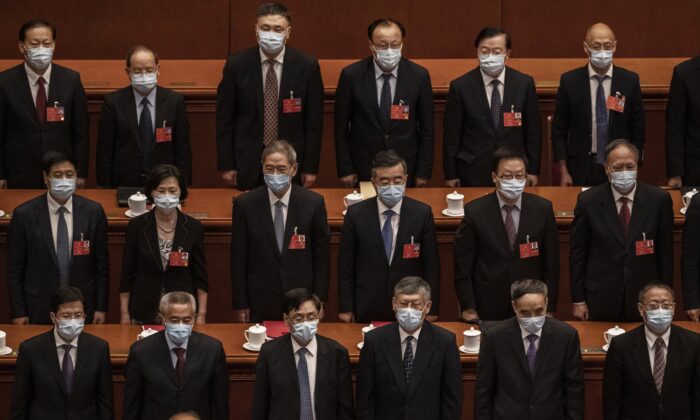Second Group of US Diplomats Fly Back to China Amid Frayed Ties
After news reports emerged that the U.S. administration was considering banning Chinese Communist Party (CCP) members and their family members from traveling to the United States, the Chinese regime reacted angrily, while netizens welcomed the decision.
Chinese foreign ministry spokeswoman Hua Chunying warned Washington not to conduct such a ban during a July 16 press conference, while state-run media also ran articles criticizing the proposal.
The New York Times first quoted anonymous sources in a July 15 report that the Trump administration was considering a travel ban on CCP members and their families.
China has roughly 91.9 million Party members as of the end of 2019, according to state-run media Xinhua. Almost all Chinese government officials and military officers, as well as leaders of state-run firms and organizations, are Party members.
In the past decade, amid China’s political and economic instability, a growing number of CCP officials’ family members have immigrated to the United States and other Western countries, and transferred their assets overseas.
Many top Party officials also send their children to study abroad in the United States, such as Chinese leader Xi Jinping’s daughter, who graduated from Harvard University; Chinese premier Li Keqiang’s daughter, who studied at Harvard in early 2010s; and Politburo standing committee Wang Yang’s daughter graduated from Tufts University in Massachusetts.
If there is indeed a travel ban in the works, those family members may choose to return to China and reunite with the officials, while many Chinese students will have to give up on their hopes of studying abroad.
However, Chinese netizens were excited about the news, and urged the White House to launch this ban as soon as possible. On the social media platform Weibo, they expressed that the ban would stop corrupt officials from transferring their embezzled assets abroad, and prevent such officials from escaping China once they get in the regime’s crosshairs. Twitter is banned inside China, but many use firewall-circumventing software to access the platform.
“China suffered from corruption for decades. [The travel ban] is the specific medicine that we have waited for so long,” wrote Chinese netizen Baozi on Weibo on July 16.
 Chinese citizens wait in line to submit their visa applications at the US Embassy in Beijing, China on April 27, 2012. (Ed Jones/AFP/GettyImages)
Chinese citizens wait in line to submit their visa applications at the US Embassy in Beijing, China on April 27, 2012. (Ed Jones/AFP/GettyImages)“President Trump is the director of China’s anti-corruption bureau!” one netizen Qingchun joked on Weibo.
Netizen Yan Yilin suggested that other members of the Five Eyes alliance, Canada, Australia, UK, and New Zealand, should join the United States in launching such a ban.
Some overseas Chinese netizens even proposed: “Every Chinese needs to claim on social media that he/she is not a CCP member before he/she enters the U.S.” When applying for immigrant visas to the United States, travelers are asked whether they are a member of communist party organizations.
They explained that a real CCP member won’t dare to claim on Chinese social media that they are not, because China’s internet surveillance would catch the message and authorities are likely to punish the official or his family for such disloyalty.
Ban CCP Members
On July 16, the Wall Street Journal quoted an insider who said senior Trump administration officials were discussing the travel ban.
At a July 16 press conference, Chinese foreign ministry spokeswoman Hua Chunying said she didn’t know about the travel ban. “If this is true, I think that the U.S. is very pathetic,” Hua said.
She also asked rhetorically, “As the most powerful country in the world—aside from giving out threats and sanctions—what other impression could the United States give to the world?”
Meanwhile, Hu Xijin, chief editor of state-run newspaper Global Times, posted a long article on Weibo to criticize the travel ban: “It is a crime that damages world peace. It will push human beings into a 21th century that is filled with enormous uncertainty.”
After Hua and Hu’s comments, the Chinese words for “Quit CCP” (“tuidang”) became a popular keyword on Google’s search term trends.
 Google Trends show that the Chinese words, ‘Quit CCP,” became a popular keyword on July 16, 2020. (Screenshot)
Google Trends show that the Chinese words, ‘Quit CCP,” became a popular keyword on July 16, 2020. (Screenshot)In China, the regime doesn’t allow CCP members to quit the organization.
But in recent years, a grassroots movement has emerged among Chinese people around the world, to denounce and quit the CCP. According to the information available on the website of U.S.-based nonprofit the Tuidang Center, to date 360 million people have renounced their association with the CCP and its affiliated organizations.
Focus News: Idea of US Ban for Chinese Communist Party Members Welcomed by Chinese Netizens
Beijing ‘Grooming’ Australian Businesses to Lobby Federal Government on Its Behalf: Expert
